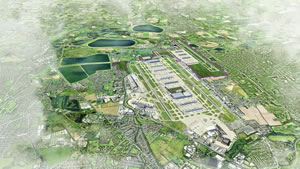Heathrow revises third runway plans following local consultation
HACAN not impressed with sheer volume of planes
Heathrow announced last week an improved third runway proposal that has been shaped by feedback from local residents and businesses.
Since Heathrow’s proposal for a new runway to the north-west of the current site was short-listed by the Commission in December, the airport has consulted with local communities. The feedback identified aircraft noise, air pollution, safety, road-traffic congestion and jobs as the top five concerns. As well as addressing these concerns in the new plans, Heathrow has put forward proposals which aim to bring maximum benefit to the local and UK economy, adding £100bn of economic benefit to the UK as a whole and creating 50,000 new local jobs.
Key elements of Heathrow’s proposals which reflect the input from local residents and businesses include:
Protecting more than 100,000 existing local jobs and creating 50,000 new jobs in the area
- By benefitting local businesses through providing direct links to emerging markets around the world improving opportunities for exports and inward investment
- By developing existing local employment, apprenticeships and skills programmes through initiatives like the Heathrow Academy
- By safeguarding land for commercial developments such as office, hotel and conference facilities
Treating those most affected by a third runway fairly
- By proposing compensation of 25% above market value, all legal fees and stamp duty costs for a new home for anyone whose home needs to be purchased
- By working with a panel of local community representatives to develop detailed compensation proposals and consulting this summer on them
- By allocating £550m to noise insulation & residential property compensation
- By developing new green spaces and flood protection and providing the option of preserving the Grade I listed Great Barn at Harmondsworth and the Grade II* listed St Mary’s Church in their current locations
Reducing aircraft noise, lessening impacts for people under flight paths and meeting local air quality limits
- By encouraging quieter aircraft and routing them higher over London resulting in at least 30% fewer people being affected by significant aircraft noise compared to today
- By maintaining the principle of runway alternation which provides significant periods of relief from noise for all communities around Heathrow
- By increasing public transport use through the provision of new rail and bus options as an alternative to travelling to Heathrow by road and by considering the case for introducing a new congestion charge
John Holland-Kaye, Chief Executive Designate of Heathrow said:
“We know that opinion is divided locally about whether a third runway should go ahead or not, but everyone has an interest in making sure that if a third runway does happen it is developed in the best way possible. This is why we have gone to lengths to ensure that local residents’ and businesses’ views have been reflected in our submission. We would like to thank those who participated in the consultation process and have helped shape our plans for a third runway.”
“We believe our submission addresses the top local concerns. Our submission reduces the number of properties that will need to be purchased and the number of people affected by significant noise. We believe our proposed compensation for compulsory residential property purchase is a fair offer. A third runway will provide an additional 50,000 local jobs which will be a significant boost for communities around the airport.”
“Heathrow will continue to work with local communities in order to guarantee that their voices are heard throughout the process.”
Campaign group HACAN, which opposes expansion at Heathrow, is sceptical of Heathrow’s claims that the noise climate will improve if a third runway is built. Heathrow argues in its revised plans released today that quieter planes and improved operational procedures, such aircraft flying higher for longer, will cut the number of people exposed to noise by 45%.
HACAN Chair John Stewart said, “What these claims don’t take into account is the fact that it is the sheer volume of planes which disturbs people and a third runway will mean an extra 260,000 flights using Heathrow every year. It is a Alice-in-Wonderland fantasy to argue that over quarter of a million planes extra a year will not bring greater noise problems for most residents under the flight paths”.
HACAN has said that the detailed maps which Heathrow released show that hundreds of homes on the just outside the boundary of the new runway would be uninhabitable if it went ahead. HACAN also questions whether the Grade 1 listed Harmondsworth Great Barn will, in reality, remain standing if expansion took place.
The maps show that hundreds of homes in Sipson would be within yards of the new runway and that Hamondsworth Great Barn and the Grade 2 listed St Mary’s Church beside it would very close to the airport .
HACAN Chair John Stewart said: “We believe that Heathrow have cynically underestimated the number of homes that would need to go and are misleading people. Sipson would be uninhabitable and the Great Barn would be so close to the runway that it could serve as a canteen for the cabin crew to get a final coffee before boarding their plane.”
May 21, 2014
Related links
|
